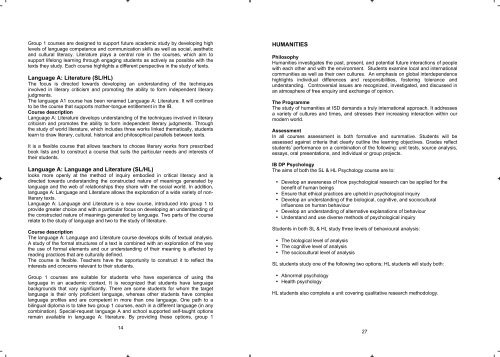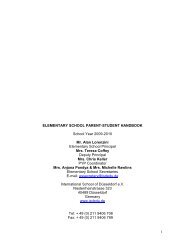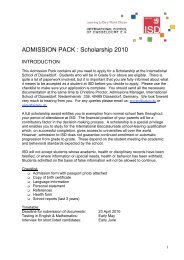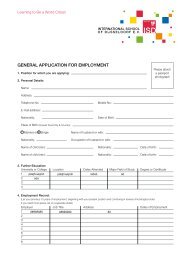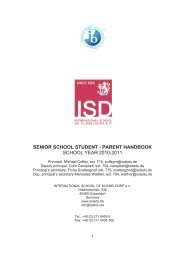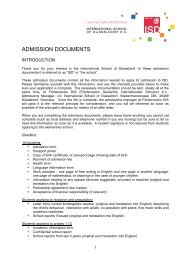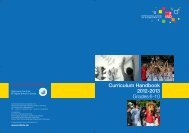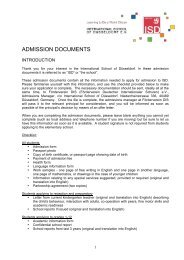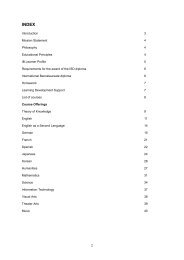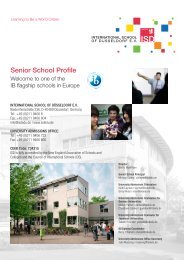Curriculum Handbook 2012-2013 Grades 11-12 - International ...
Curriculum Handbook 2012-2013 Grades 11-12 - International ...
Curriculum Handbook 2012-2013 Grades 11-12 - International ...
You also want an ePaper? Increase the reach of your titles
YUMPU automatically turns print PDFs into web optimized ePapers that Google loves.
Group 1 courses are designed to support future academic study by developing high<br />
levels of language competence and communication skills as well as social, aesthetic<br />
and cultural literacy. Literature plays a central role in the courses, which aim to<br />
support lifelong learning through engaging students as actively as possible with the<br />
texts they study. Each course highlights a different perspective in the study of texts.<br />
Language A: Literature (SL/HL)<br />
The focus is directed towards developing an understanding of the techniques<br />
involved in literary criticism and promoting the ability to form independent literary<br />
judgments.<br />
The language A1 course has been renamed Language A: Literature. It will continue<br />
to be the course that supports mother-tongue entitlement in the IB.<br />
Course description<br />
Language A: Literature develops understanding of the techniques involved in literary<br />
criticism and promotes the ability to form independent literary judgments. Through<br />
the study of world literature, which includes three works linked thematically, students<br />
learn to draw literary, cultural, historical and philosophical parallels between texts.<br />
It is a flexible course that allows teachers to choose literary works from prescribed<br />
book lists and to construct a course that suits the particular needs and interests of<br />
their students.<br />
Language A: Language and Literature (SL/HL)<br />
looks more openly at the method of inquiry embodied in critical literacy and is<br />
directed towards understanding the constructed nature of meanings generated by<br />
language and the web of relationships they share with the social world. In addition,<br />
language A: Language and Literature allows the exploration of a wide variety of nonliterary<br />
texts.<br />
Language A: Language and Literature is a new course, introduced into group 1 to<br />
provide greater choice and with a particular focus on developing an understanding of<br />
the constructed nature of meanings generated by language. Two parts of the course<br />
relate to the study of language and two to the study of literature.<br />
Course description<br />
The language A: Language and Literature course develops skills of textual analysis.<br />
A study of the formal structures of a text is combined with an exploration of the way<br />
the use of formal elements and our understanding of their meaning is affected by<br />
reading practices that are culturally defined.<br />
The course is flexible. Teachers have the opportunity to construct it to reflect the<br />
interests and concerns relevant to their students.<br />
Group 1 courses are suitable for students who have experience of using the<br />
language in an academic context. It is recognized that students have language<br />
backgrounds that vary significantly. There are some students for whom the target<br />
language is their only proficient language, whereas other students have complex<br />
language profiles and are competent in more than one language. One path to a<br />
bilingual diploma is to take two group 1 courses, each in a different language (in any<br />
combination). Special-request language A and school supported self-taught options<br />
remain available in language A: literature. By providing these options, group 1<br />
14<br />
HUMANITIES<br />
Philosophy<br />
Humanities investigates the past, present, and potential future interactions of people<br />
with each other and with the environment. Students examine local and international<br />
communities as well as their own cultures. An emphasis on global interdependence<br />
highlights individual differences and responsibilities, fostering tolerance and<br />
understanding. Controversial issues are recognized, investigated, and discussed in<br />
an atmosphere of free enquiry and exchange of opinion.<br />
The Programme<br />
The study of humanities at ISD demands a truly international approach. It addresses<br />
a variety of cultures and times, and stresses their increasing interaction within our<br />
modern world.<br />
Assessment<br />
In all courses assessment is both formative and summative. Students will be<br />
assessed against criteria that clearly outline the learning objectives. <strong>Grades</strong> reflect<br />
students’ performance on a combination of the following: unit tests, source analysis,<br />
essays, oral presentations, and individual or group projects.<br />
IB DP Psychology<br />
The aims of both the SL & HL Psychology course are to:<br />
• Develop an awareness of how psychological research can be applied for the<br />
benefit of human beings<br />
• Ensure that ethical practices are upheld in psychological inquiry<br />
• Develop an understanding of the biological, cognitive, and sociocultural<br />
influences on human behaviour<br />
• Develop an understanding of alternative explanations of behaviour<br />
• Understand and use diverse methods of psychological inquiry<br />
Students in both SL & HL study three levels of behavioural analysis:<br />
• The biological level of analysis<br />
• The cognitive level of analysis<br />
• The sociocultural level of analysis<br />
SL students study one of the following two options; HL students will study both:<br />
• Abnormal psychology<br />
• Health psychology<br />
HL students also complete a unit covering qualitative research methodology.<br />
27


